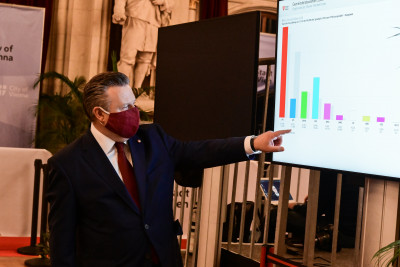Covid-19 in Austria: Vienna Reduces Validity for Access Tests
The validity of Corona tests will be significantly reduced in Vienna. The reason for this is the increasing numbers due to the delta variant.
 Ludwig: "PCR tests will only be valid for 48 hours instead of 72 hours." / Picture: © Magistrat der Stadt Wien / Christian Jobst / PID
Ludwig: "PCR tests will only be valid for 48 hours instead of 72 hours." / Picture: © Magistrat der Stadt Wien / Christian Jobst / PID
Corona infection figures are rising throughout Austria.
As a result, the federal state of Vienna is relying on strict precautionary measures against the Corona virus from September 1.
In the federal capital, PCR tests will only be valid for 48 hours instead of 72 hours as of the first of the month.
Antigen tests performed by authorized facilities such as pharmacies are now only valid for 24 hours.
For children under 12, PCR tests will continue to apply 72 hours; antigen tests for those under 12 will continue to apply 48 hours.
This was announced by Mayor Michael Ludwig in a press statement following a roundtable of experts at City Hall.
Further upright remain in Vienna the stricter measures than in the other provinces, especially with mask and test obligation also for children, which apply since summer.
"The pandemic is not over," stressed Mayor Michael Ludwig, on the occasion of the stricter Covid measures. Across Europe, he said, infection numbers and seven-day incidences are rising. The city is preparing for an increase in cases in the fall. "As the city of Vienna, we were more cautious even before the summer, and we were heavily criticized for it. We have been proven right with our course," said mayor Ludwig. In addition to expanding the range of vaccinations, he said reliable and regular testing is an effective means of combating the spread of the virus. "The longer the virus can move, the higher the risk of dangerous mutations," the mayor stressed.
At present, it is becoming apparent that children will be most affected by the Corona wave in the fall, Ludwig said. "Where the vacations are already over, you see significant increases in numbers, for example in the German state of North Rhine-Westphalia." Children may also carry the virus into families, he said. Since children under 12 cannot yet be vaccinated, it is important to reliably test even the youngest, he said.
Ludwig did not rule out further tightening of measures in the course of the fall - including the introduction of the so-called "1-G rule" in restaurants and night catering - i.e. access only for those who have been vaccinated. Stricter measures would depend on the development of the pandemic. In any case, Vienna would continue to rely on regular and reliable tests. Tests would remain free of charge in Vienna, Ludwig assured. "We want to keep testing numbers as high as possible, especially with the 'gold standard' of tests, PCR tests."
Regular testing is necessary to protect those who cannot be vaccinated - such as children - or who do not want to be vaccinated either, he said. "You can argue about it for a long time, but that's the way it is," Ludwig said. He spoke out against compulsory vaccination; instead of coercion, Ludwig said, education, information and persuasion, also through the efforts of "opinion leaders," should be used to convince those who refuse to be vaccinated. He referred once again to the broad vaccination offer of the city with several vaccination streets, vaccination locations in St. Stephen's Cathedral and shopping centers over the vaccination bus up to vaccination at the supermarket checkout.
Already in the summer, Vienna had relied on stricter precautionary measures than other federal states. For example, stricter "3-G rules" apply in Vienna, including compulsory testing for children over the age of six when visiting leisure facilities and compulsory registration in the catering trade.



